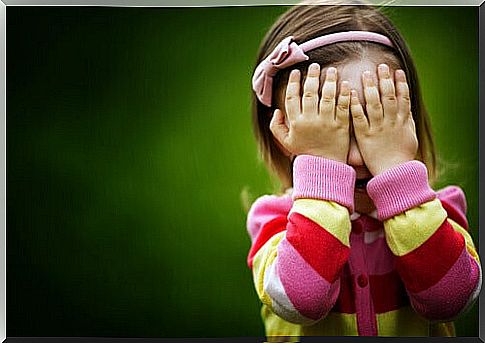7 Unpleasant Emotions That Children Must Learn To Manage

Keeping away from unpleasant emotions is impossible, both for adults and for children. While we would like our children to go around the world protected by a glass dome to prevent them from suffering, the truth is that this would be completely counterproductive.
Many parents, however, try to avoid in every way that their children experience these unpleasant emotions and in the long run this attitude is negative, since sooner or later even the little ones will have to deal with situations that cause them pain and frustration. Continuing to protect them will make their adult life more difficult.
Don’t protect children from unpleasant emotions, but teach them to handle them properly when they arise. Children need to learn to deal with these feelings in a healthy way.

How to help children deal with unpleasant emotions
While not an easy task, teaching children how to cope with pain, sadness, anger and many other negative emotions will prepare them for life. These unpleasant emotions will become more and more intense, so learning to manage them from an early age will make it easier for you to adapt and mature .
Training children to cope with their emotions is the best way to prepare them to deal with the responsibilities and disappointments of adult life.
Teach children to manage boredom
Boredom is an emotion that can affect everyone. Children are among the first to be inclined to be bored, and therefore require more and more attention. But the fact that a child is bored does not always mean that the adult has to solve his problems. In fact, sometimes it can be good for children to get a little bored.
Boredom stimulates their innate ability to be creative. For this reason, we need to encourage children to find a fun way to spend their time on their own, and not be the ones to provide them with constant entertainment.
Encourage the child to be proactive to overcome boredom, and get him to think positively about how to solve this problem.

Teach children to manage frustration
Wanting to help a child when frustrated is a natural reaction, but children need to learn how to manage this emotion effectively. There won’t always be someone who can do it for them, so they need to know how to deal with a frustrating situation.
If a child is having a hard time finishing schoolwork or completing a puzzle, building a game, etc. we don’t have to do the work for it. In this way, we only increase his frustration as he grows up.
On the contrary, in these cases it is necessary to talk to the child, help him to calm down and stimulate him in the search for a solution. He will learn that to resolve a frustrating situation, the first step is to calm down.
If a child cannot solve his problems on his own, he may develop a feeling of learned inability. That is to say, he will grow up convinced that he always needs others to solve his problems.
Teach children to manage sadness
Sadness is an emotion that accompanies us throughout our life. It is a normal reaction, which occurs as a response to certain events and situations. Children must learn to identify sadness and understand that it is normal, that it can happen.
Your children must learn that life is not all roses. Let them experience their sadness naturally, as this will help them feel better about themselves and their feelings. After all, sadness is not negative, it is just frowned upon.
Teach children to manage anxiety
Constant anxiety is not a healthy feeling for children. It is therefore important that they are able to recognize when they are feeling anxious and to identify the situations that cause this feeling in them. Only in this way will they be able to identify and manage it.
They also need to learn to deal with the fears generated by anxiety, and understand that that emotion doesn’t have to stop them from getting what they want, whether it’s their favorite game or a high grade on a test.
When a child feels anxious, it is important to help him understand what is happening to him and teach him how to calm down. Sometimes it is necessary to let the little ones express the feelings of anxiety, in order to be able to show them what is going on and to help them overcome their fears. Repressing this feeling is useless.

Teach children to manage disappointment
Disappointment is a feeling that occurs in children for many different reasons, which are almost always beyond our control. It may be that their favorite team has lost a game, that they cannot find their favorite dessert, that their friend has been assigned to a different group or that their mum or dad does not return in time to play with them before dinner. .
Regardless of the reason that triggers it, disappointment is a feeling that will accompany them throughout their life, and that they must learn to manage. If they don’t, they will always live with the feeling that all disappointment is the end of the world.
Preventing children from feeling disappointed or trying to please them all the time will only make them temperamental and self-centered.
Teach children to manage anger
Anger is not a negative emotion. The bad thing is our reaction when we experience it. Children need to learn healthy ways of dealing with anger and angry feelings, and they need to understand that being aggressive is neither necessary nor healthy.
When a child gets angry, we need to teach him to calm his body, breathing deeply and waiting. Counting to ten is a formula that works for both children and adults, and allows us to distance ourselves from the situation and control it better.
Teach children to manage feelings of guilt
We can’t always accept children’s apologies and turn a blind eye to what they do. Children must learn to recognize that their behavior affects others, and that apologizing is not always enough. It’s not about making them feel ashamed, but about arousing a healthy sense of guilt that causes them to make a constructive change.
If we accept a child’s apology without helping them understand that the blame and responsibility for what happened is theirs, the child will not learn that their actions can hurt others.









